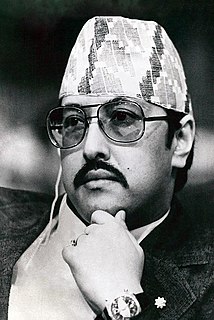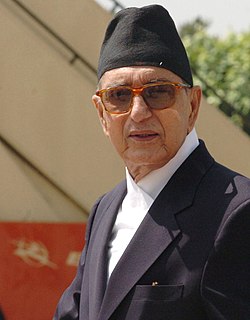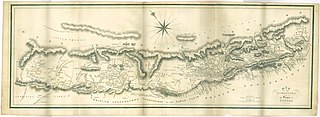
The history of Nepal is intertwined with the history of the broader Indian subcontinent and the surrounding regions, comprising the areas of South Asia and East Asia.

The politics of Nepal functions within the framework of a parliamentary republic with a multi-party system. Executive power is exercised by the Prime Minister and their cabinet, while legislative power is vested in the Parliament.

Mount Everest is Earth's highest mountain above sea level, located in the Mahalangur Himal sub-range of the Himalayas. The China–Nepal border runs across its summit point. Its elevation of 8,848.86 m (29,031.7 ft) was most recently established in 2020 by the Nepali and Chinese authorities.

Nepal, officially the Federal Democratic Republic of Nepal, is a landlocked country located in South Asia. It is mainly situated in the Himalayas, but also includes parts of the Indo-Gangetic Plain, bordering Tibet of China to the north, and India in the south, east, and west, while it is narrowly separated from Bangladesh by the Siliguri Corridor, and from Bhutan by the Indian state of Sikkim. Nepal has a diverse geography, including fertile plains, subalpine forested hills, and eight of the world's ten tallest mountains, including Mount Everest, the highest point on Earth. Nepal is a multi-ethnic, multi-lingual, multi-religious and multi-cultural state, with Nepali as the official language. Kathmandu is the nation's capital and the largest city.

Birendra Bir Bikram Shah Dev was the king of Nepal from 1972 until 2001. As the eldest son of King Mahendra, he reigned until his death by assassination in the 2001 Nepalese royal massacre.

Gyanendra Shah reigned as the King of Nepal from 2001 to 2008. As a child, he was briefly king from 1950 to 1951, when his grandfather, Tribhuvan, went into exile in India with the rest of his family. His second reign began after the 2001 Nepalese royal massacre. He was deposed by the first session of the Constituent Assembly on 28 May 2008, thereby declaring the nation as the Federal Democratic Republic of Nepal and abolishing the 240-year reign of the Shah Dynasty.

Pushpa Kamal Dahal, also widely known by his nom de guerre Prachanda, meaning "fierce", is a Nepalese politician who served as Prime Minister of Nepal from 2008 to 2009 and again from 2016 to 2017.

The Communist Party of Nepal , abbreviated CPN (UML), is the major communist party in Nepal since its formation in January 1991, merging the Communist Party of Nepal (Marxist) and the Communist Party of Nepal (Marxist–Leninist). At today's date, it is the largest opposition party of Nepal.

Sher Bahadur Deuba is a Nepali politician serving as the Prime Minister of Nepal since 13 July 2021. He has previously served four terms as the prime minister and is the Member of Parliament for the parliamentary constituency of Dadeldhura–1. He has been the president of the Nepali Congress since 2016.

Nepal Ratna Girija Prasad Koirala, affectionately known as Girija Babu, also known as G.P. Koirala, was a Nepalese politician. But by birth place he was Indian. He headed the Nepali Congress and served as the Prime Minister of Nepal on four occasions, including from 1991 to 1994, 1998 to 1999, 2000 to 2001, and from 2006 to 2008. He was the Acting Head of State of Nepal between January 2007 and July 2008 as the country transitioned from a monarchy to a republic.

The Nepal national cricket team nicknamed The Rhinos and Gorkhalis, represents the country of Nepal in the International cricket and is governed by the Cricket Association of Nepal (CAN). They have been an Associate Member of the International Cricket Council (ICC) since 1996. Nepal were awarded Twenty20 International (T20I) status by the ICC in June 2014 until the 2015 ICC World Twenty20 Qualifier. On 15 March 2018, Nepal gained One Day International (ODI) status for the first time, after winning the first playoff match in the 2018 Cricket World Cup Qualifier.

Madhav Kumar Nepal (Nepali: माधवकुमार नेपाल, [madʱʌbˈkumar neˈpal]; known informally as "Makuney" (Nepali: माकुने, Nepali pronunciation: [makune]; is a Nepali politician who served as the Prime Minister of Nepal from 25 May 2009 to 6 February 2011. He previously served as the deputy prime minister, Minister of Foreign Affairs and Minister of Defence in the cabinet of Man Mohan Adhikari. He was previously the General Secretary of Communist Party of Nepal for 15 years.

The Kosi or Koshi is a trans-boundary river which flows through Tibet, Nepal and India. It drains the northern slopes of the Himalayas in Tibet and the southern slopes in Nepal. From a major confluence of tributaries north of the Chatra Gorge onwards, the Kosi River is also known as Saptakoshi for its seven upper tributaries. These include the Tamor River originating from the Kanchenjunga area in the east and Arun River and Sun Kosi from Tibet. The Sun Koshi's tributaries from east to west are Dudh Koshi, Bhote Koshi, Tamakoshi River, Likhu Khola and Indravati. The Saptakoshi crosses into northern Bihar, India where it branches into distributaries before joining the Ganges near Kursela in Katihar district.

The Federal Parliament of Nepal is the bicameral federal and supreme legislature of Nepal established in 2018. It consists of the National Assembly as the upper house and the House of Representatives as the lower house.

The emblem of Nepal was changed during the reconciliation period following the Nepalese Civil War. On 28 May 2008, a new emblem in the style of socialist heraldry was introduced. On 13 June 2020, the emblem was revised to include the newly issued map which includes the Kalapani territory and Lipulekh pass.

Constituent Assembly elections were held in Nepal on 10 April 2008, having been postponed from earlier dates of 7 June 2007 and 22 November 2007. The Constituent Assembly was planned to draft a new constitution and therefore decide, amongst other things, on the issue of federalism. The number of eligible voters was around 17.5 million. The Constituent Assembly was originally set to have a term of two years.

The president of Nepal is the head of state of Nepal and the Commander-in-chief of the Nepali Army.

The position of vice president of Nepal constitutes the deputy head of state of Nepal and was created when the Nepalese monarchy was abolished in May 2008. The current vice-president of Nepal is Nanda Kishor Pun. The vice president is to be formally addressed as 'His Excellency'.
The 1991 Nepal census was a widespread national census conducted by the Nepal Central Bureau of Statistics.

Greater Nepal is a nascent irredentist concept of Nepal extending beyond its present boundaries to include current Indian territories, which were once controlled by the Gorkha army. After defeating some neighbouring kingdoms in wars between 1791 to 1804, the Gorkhas were defeated by the British East India Company in the 1814–16 Anglo-Nepalese War and were made to cede the territories under the 1816 Sugauli Treaty. Greater Nepal is aimed at setting the clock back to the status before the Sugauli Treaty.
















